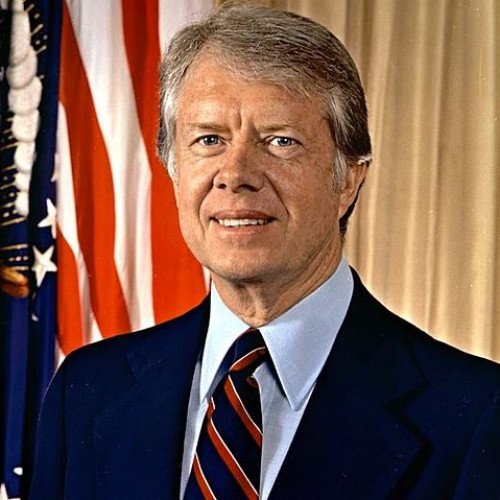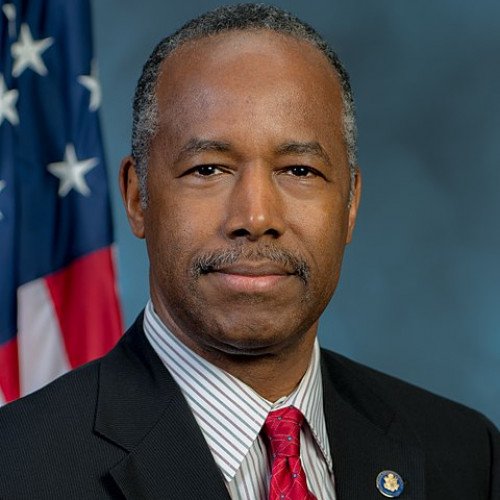Jimmy Carter VS Ben Carson

Jimmy Carter
James Earl Carter Jr. (born October 1, 1924) is an American politician and philanthropist who served as the 39th president of the United States from 1977 to 1981. A member of the Democratic Party, he previously served as a Georgia State Senator from 1963 to 1967 and as the 76th governor of Georgia from 1971 to 1975. Since leaving the presidency, Carter has remained engaged in political and social projects as a private citizen. In 2002, he was awarded the Nobel Peace Prize for his work in co-founding the Carter Center. Raised in Plains, Georgia, Carter graduated from the United States Naval Academy in 1946 with a Bachelor of Science degree and joined the United States Navy, where he served on submarines. After the death of his father in 1953, Carter left his naval career and returned home to Georgia to take up the reins of his family's peanut-growing business. Carter inherited comparatively little due to his father's forgiveness of debts and the division of the estate among the children. Nevertheless, his ambition to expand and grow the Carters' peanut business was fulfilled. During this period, Carter was motivated to oppose the political climate of racial segregation and support the growing civil rights movement. He became an activist within the Democratic Party. From 1963 to 1967, Carter served in the Georgia State Senate, and in 1970, he was elected as Governor of Georgia, defeating former Governor Carl Sanders in the Democratic primary on an anti-segregation platform advocating affirmative action for ethnic minorities. Carter remained as governor until 1975. Despite being a dark-horse candidate who was little known outside of Georgia at the start of the campaign, Carter won the 1976 Democratic presidential nomination. In the general election, Carter ran as an outsider and narrowly defeated incumbent Republican President Gerald Ford. On his second day in office, Carter pardoned all the Vietnam War draft evaders by issuing Proclamation 4483. During Carter's term as president, two new cabinet-level departments, the Department of Energy and the Department of Education, were established. He established a national energy policy that included conservation, price control, and new technology. In foreign affairs, Carter pursued the Camp David Accords, the Panama Canal Treaties, the second round of Strategic Arms Limitation Talks (SALT II), and the return of the Panama Canal Zone to Panama. On the economic front, he confronted stagflation, a persistent combination of high inflation, high unemployment and slow growth. The end of his presidential tenure was marked by the 1979–1981 Iran hostage crisis, the 1979 energy crisis, the Three Mile Island nuclear accident, and the Soviet invasion of Afghanistan. In response to the invasion, Carter escalated the Cold War when he ended détente, imposed a grain embargo against the Soviets, enunciated the Carter Doctrine, and led a 1980 Summer Olympics boycott in Moscow. In 1980, Carter faced a challenge from Senator Ted Kennedy in the primaries, but he won re-nomination at the 1980 Democratic National Convention. Carter lost the general election to Republican nominee Ronald Reagan in an electoral landslide. He is the only president in American history to serve a full term of office and never appoint a justice to the Supreme Court. Polls of historians and political scientists usually rank Carter as a below-average president. Carter's activities since leaving the presidency have been viewed more favorably than his presidency itself. In 1982, Carter established the Carter Center to promote and expand human rights. He has traveled extensively to conduct peace negotiations, monitor elections, and advance disease prevention and eradication in developing nations. Carter is considered a key figure in the Habitat for Humanity charity. He has written over 30 books, ranging from political memoirs to poetry, while continuing to actively comment on ongoing American and global affairs such as the Israeli-Palestinian conflict.
Statistics for this Xoptio

Ben Carson
Benjamin Solomon Carson Sr. (born September 18, 1951) is an American politician, author, and retired neurosurgeon who served as the 17th United States Secretary of Housing and Urban Development from 2017 to 2021. He was a candidate for President of the United States in the 2016 Republican primaries. He is considered a pioneer in the field of neurosurgery.Carson became the Director of Pediatric Neurosurgery at the Johns Hopkins Children’s Center in 1984 at age 33; he was the youngest chief of pediatric neurosurgery in the United States. At retirement, he was professor of neurosurgery, oncology, plastic surgery, and pediatrics at the Johns Hopkins School of Medicine. Carson's achievements include participating in the first reported separation of conjoined twins joined at the back of the head. Although surgically a success, the twins continued to suffer neurologic/medical complications. Additional accomplishments include performing the first successful neurosurgical procedure on a fetus inside the womb; developing new methods to treat brain-stem tumors; and revitalizing hemispherectomy techniques for controlling seizures. He wrote over 100 neurosurgical publications. He retired from medicine in 2013. Carson gained national fame among political conservatives after delivering a speech at the 2013 National Prayer Breakfast which was perceived as critical of the policies of President Barack Obama. Following widespread speculation of a presidential run, Carson officially announced his campaign for the 2016 Republican nomination for President in May 2015. Carson performed strongly in early polls, leading to him being considered a frontrunner for the nomination during the fall of 2015; however, his polling support began to decline following scrutiny of his foreign policy credentials after the November 2015 Paris attacks. Carson withdrew from the race after Super Tuesday, following a string of disappointing primary results, and endorsed Donald Trump. Following Trump's victory, Trump nominated Carson as Secretary of Housing and Urban Development, being confirmed by the United States Senate in a 58–41 vote on March 2, 2017. Carson has also been seen as a "symbol" of black conservatism.Carson has received numerous honors for his neurosurgery work, including more than 60 honorary doctorate degrees and numerous national merit citations. In 2001, he was named by CNN and TIME magazine as one of the nation's 20 foremost physicians and scientists, and was selected by the Library of Congress as one of 89 "Living Legends" on its 200th anniversary. In 2008, Carson was bestowed the Presidential Medal of Freedom, the highest civilian award in the United States. In 2010, he was elected into the National Academy of Medicine. He was the subject of the 2009 TV film Gifted Hands: The Ben Carson Story, where he was portrayed by Cuba Gooding Jr.